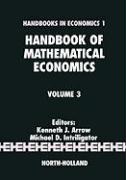Read more
Informationen zum Autor Michael D. Intriligator is Professor Emeritus of Economics, Political Science, and Policy Studies at the University of California, Los Angeles (UCLA), where he is also Co-Director of the Jacob Marschak Interdisciplinary Colloquium on Mathematics in the Behavioral Sciences. In addition, he is a Senior Fellow at the Milken Institute in Santa Monica, a Senior Fellow of the Gorbachev Foundation of North America in Boston, a Foreign Member of the Russian Academy of Science, and a Fellow of the American Association for the Advancement of Science. He received his Ph.D. in Economics at MIT in 1963 and the same year joined the UCLA Department of Economics. He teaches courses in economic theory, econometrics, mathematical economics, international relations, and health economics, and he has received several distinguished teaching awards. Kenneth Arrow is the Joan Kenney Professor of Economics and Professor of Operations Research, emeritus; a CHP/PCOR fellow; and an FSI senior fellow by courtesy. He is the joint winner of the Nobel Memorial Prize in Economics with John Hicks in 1972. To date, he is the youngest person to have received this award, at 51. In economics, he is a figure in post-World War II neo-classical economic theory. Many of his former graduate students have gone on to win the Nobel Memorial Prize themselves. His most significant works are his contributions to social choice theory, notably "Arrow's impossibility theorem", and his work on general equilibrium analysis. He has also provided foundational work in many other areas of economics, including endogenous growth theory and the economics of information. He has been co-editor of the Handbooks in Economics series since the mid-1980s.
List of contents
Mathematical Approaches to Welfare Economics. Social choice theory (A.
Sen). Information and the market (K.J. Arrow). The theory of optimal taxation
(J.A. Mirrlees). Positive second-best theory (E. Sheshinski, K.P. Hagen).
Optimal economic growth, turnpike theorems and comparative dynamics (L.W.
McKenzie). Mathematical Approaches to Economic Organization and
Planning. Organization design (T.A. Marschak). Incentive aspects of
decentralization (L. Hurwicz). Planning (G. Heal).

